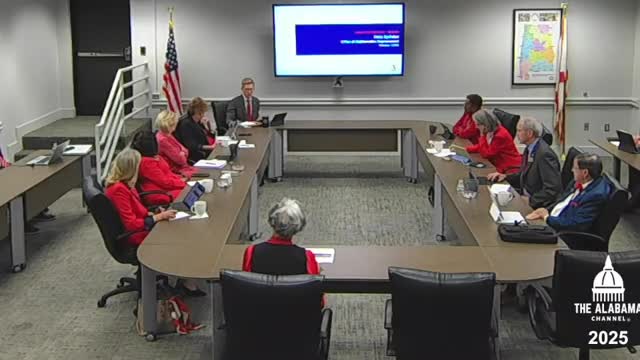Office of Mathematics Improvement reports gains in supported schools; coaching model credited
Get AI-powered insights, summaries, and transcripts
Subscribe
Summary
The Office of Mathematics Improvement told the State Board of Education that most schools receiving full OMI support showed ACAP growth in 2024'25; presenters credited weekly coaching, protected instructional time and high-quality instructional materials.
The Alabama State Department of Education—s Office of Mathematics Improvement (OMI) briefed the State Board of Education on efforts to support low-performing elementary schools and reported widespread short-term gains in schools the office targeted.
Dr. Karen Anderson, presenting for OMI, described a tiered support system: full-support schools receive weekly visits from a regional coordinator and intensive coaching; limited-support schools receive biweekly support; and a third category, general support, receives other state supports. Anderson said full-support schools that OMI worked with during the 2024'25 school year posted gains on the Alabama Comprehensive Assessment Program (ACAP), with 88% of full-support schools showing an increased share of students scoring at the 3 or 4 level for grades 3—. She said 12% of those full-support schools decreased.
Board members asked for clarification about what "increased" meant; Anderson replied the figure refers to the percentage of students scoring a 3 or 4 on ACAP being higher than the previous year at those schools and that the degree of change varied by school — in some cases by double-digit percentage points. Presenters said the gains represent growth rather than a claim that all students reached proficiency.
Anderson credited a coaching model: each supported school has a building-based math coach who works with teachers in coaching cycles using data (pre-test, strategy/coaching/modeling, post-test) and the department provides funds to districts to hire coaches in some cases. Presenters said the more intensive the support, the better the growth observed.
Numbers and scope: presenters said OMI focuses on approximately the bottom 25% of elementary schools by performance (OMI—s statutory charge), representing roughly 210 schools; the bottom 6% (about 50 schools) are in the full-support cohort at present, and additional schools are designated limited support based on state criteria. Presenters said roughly 35 schools were new to OMI in the most recent cycle. The department said there are building-based math coaches at each supported school and that coaches engage directly with teachers.
Presenters said expectations include protecting 60 minutes of daily elementary math instruction, using high-quality instructional materials and using evidence-based instructional practices and that those practices are monitored through classroom visits, benchmark and screener data, and ongoing planning between coaches, principals and district staff.
The board discussed data breakdowns and asked for comparative data on general-support schools; presenters agreed to provide additional comparisons and school-level detail outside the work session.
